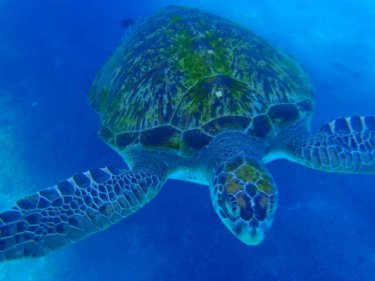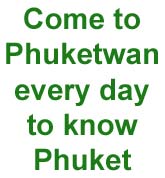A SECOND veterinarian will be employed to help injured turtles off the coast of Phuket and Phang Nga, thanks to donations amounting to 618,000 baht from JW Marriott guests.
But the real issue remains the amount of fishing that threatens all Andaman coast turtles and the future of hatching programs designed to restore a balance with nature.
Michelle Mouille, coordinator at the Mai Khao Marine Turtle Foundation, sees the benefits in helping wounded turtles but also understands the need for change.
''We are not sure what we can do,'' she said. ''You see more fishing boats on the horizon almost every night. It's lit up like a town out there.''
Intense fishing has generated the need for a second vet because of the heartbreaking injuries caused to the turtles in nets.
''The get caught up and amputate their own flippers trying to escape,'' Ms Mouille said. ''It can take days for them to break free.''
It is difficult to say at present how fast the battle to preserve a turtle presence along the west coast is being lost. The signs are not good.
Although the newer resorts along Mai Khao beach are required to be set back from the sand, ceaseless development is destroying the prospect of turtles ever returning to Phuket.
The last reported hatchings on the island predate the 2004 tsunami. Photographs of giant leatherbacks laying eggs on the island are, regrettably, just history now.
Phang Nga is facing similar pressures. A manager at a development on Phuket told Phuketwan recently how he made a day trip north of the island. While walking along an unspecified beach, he saw construction site workers dig up turtle eggs to eat.
At the centre of the battle to save the turtle is the Phuket Marine Biological Centre, behind the aquarium on Cape Panwa, where a tight budget limits research.
The latest donation will allow a second vet to be hired, the purchase of medical supplies, and construction of a new surgery.
Injured turtles are kept in a public viewing area at the centre, along with hatchlings of different ages. Visitors are always welcome.
But Ms Mouille says Government awareness and funding is desperately needed if the present threats to the future of all turtles is to be prevented from wiping them out in the region.
''We are trying to link up resorts, schools, universities, diving groups, everyone with an interest in turtles, to push for concerted action,'' she said.
''But it is difficult. We hear reports of illegal fishing in marine parks, yet fishing is a livelihood for many people.''
Nothing highlights the paradox of the turtle's future more than releases of hatchlings along the western shores. Most of the small, cute turtles freed in this way are doomed.
The marine biology centre is scaling back numbers in releases, which effectively promote the issue but do little to benefit turtle-breeding, or the creatures themselves.
While the Royal Thai Navy's breeding protection program on the Similans is viewed as a success, illegal fishing and overfishing undo much of their good work.
The Andaman's turtles, despite almost universal goodwill, remain underprotected and in grave danger. Education and real action appear to be the only hope.
Phuketwan is prepared to publish any photographs sent to us that show turtles being abused or highlight incidents of illegal fishing.
But the real issue remains the amount of fishing that threatens all Andaman coast turtles and the future of hatching programs designed to restore a balance with nature.
Michelle Mouille, coordinator at the Mai Khao Marine Turtle Foundation, sees the benefits in helping wounded turtles but also understands the need for change.
''We are not sure what we can do,'' she said. ''You see more fishing boats on the horizon almost every night. It's lit up like a town out there.''
Intense fishing has generated the need for a second vet because of the heartbreaking injuries caused to the turtles in nets.
''The get caught up and amputate their own flippers trying to escape,'' Ms Mouille said. ''It can take days for them to break free.''
It is difficult to say at present how fast the battle to preserve a turtle presence along the west coast is being lost. The signs are not good.
Although the newer resorts along Mai Khao beach are required to be set back from the sand, ceaseless development is destroying the prospect of turtles ever returning to Phuket.
The last reported hatchings on the island predate the 2004 tsunami. Photographs of giant leatherbacks laying eggs on the island are, regrettably, just history now.
Phang Nga is facing similar pressures. A manager at a development on Phuket told Phuketwan recently how he made a day trip north of the island. While walking along an unspecified beach, he saw construction site workers dig up turtle eggs to eat.
At the centre of the battle to save the turtle is the Phuket Marine Biological Centre, behind the aquarium on Cape Panwa, where a tight budget limits research.
The latest donation will allow a second vet to be hired, the purchase of medical supplies, and construction of a new surgery.
Injured turtles are kept in a public viewing area at the centre, along with hatchlings of different ages. Visitors are always welcome.
But Ms Mouille says Government awareness and funding is desperately needed if the present threats to the future of all turtles is to be prevented from wiping them out in the region.
''We are trying to link up resorts, schools, universities, diving groups, everyone with an interest in turtles, to push for concerted action,'' she said.
''But it is difficult. We hear reports of illegal fishing in marine parks, yet fishing is a livelihood for many people.''
Nothing highlights the paradox of the turtle's future more than releases of hatchlings along the western shores. Most of the small, cute turtles freed in this way are doomed.
The marine biology centre is scaling back numbers in releases, which effectively promote the issue but do little to benefit turtle-breeding, or the creatures themselves.
While the Royal Thai Navy's breeding protection program on the Similans is viewed as a success, illegal fishing and overfishing undo much of their good work.
The Andaman's turtles, despite almost universal goodwill, remain underprotected and in grave danger. Education and real action appear to be the only hope.
Phuketwan is prepared to publish any photographs sent to us that show turtles being abused or highlight incidents of illegal fishing.




